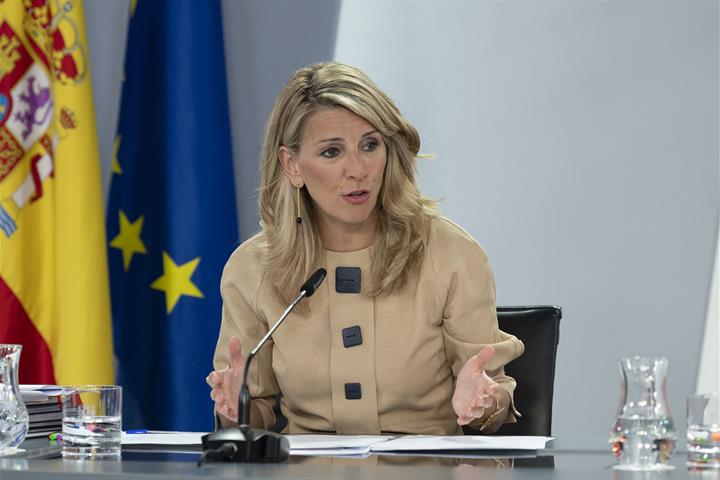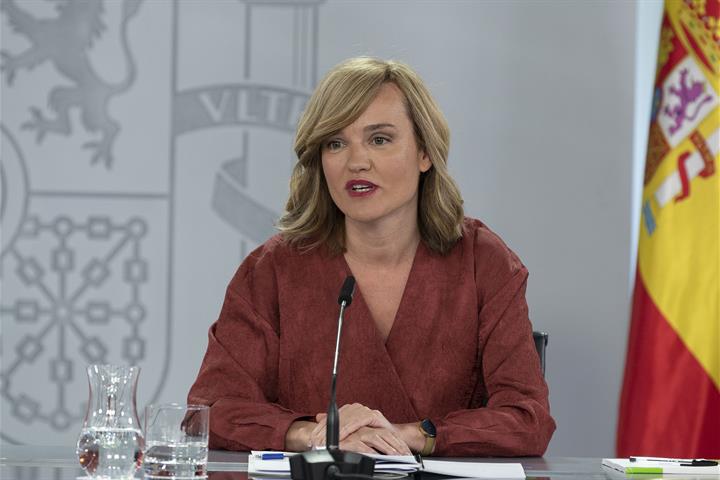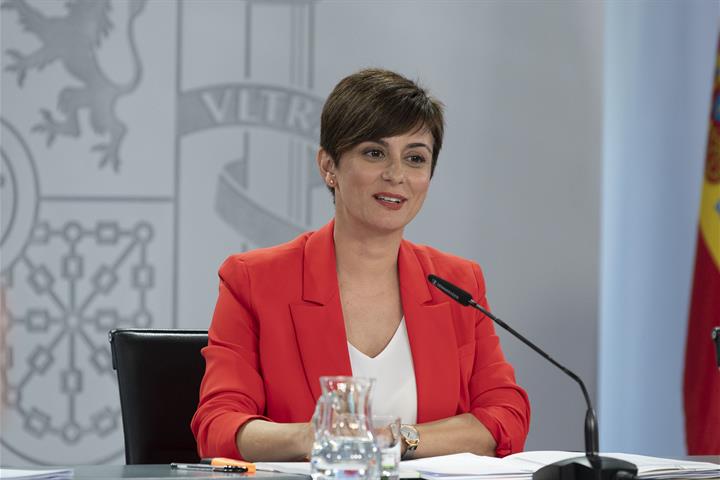Council of Ministers
The Government of Spain promotes employability, the social economy and cooperatives
Council of Ministers - 2023.4.11
Moncloa Palace, Madrid
The Council of Ministers has approved the distribution among the autonomous communities of €2.9 billion for active employment policies. These funds are financed from the budgets of the Public State Employment Service (SEPE) and the Recovery, Transformation and Resilience Plan.
Yolanda Díaz recalled that job creation is at the heart of the government's public policies, pointing out that in previous years, active policies have been aimed at recruiting young people in activities related to information, digitalisation and defence. On this occasion, she said, the policies are focused on the employability of one of the most important groups in terms of their numbers and the social alienation they suffer: the long-term unemployed. There are 1.2 million people over 45 years old in this situation.
The second vice-president encouraged the autonomous communities and employers to hire unemployed people over 45 years of age. "Companies cannot do without the talents of people who are at the top of their careers", she stated.
Social Economy Law and the Spanish Social Economy Strategy
 The Second Vice-President of the Government of Spain and Minister for Work and Social Economy, Yolanda Díaz, during her speech at the press conference after the Council of Ministers | Pool Moncloa/Borja Puig de la Bellacasa
The Second Vice-President of the Government of Spain and Minister for Work and Social Economy, Yolanda Díaz, during her speech at the press conference after the Council of Ministers | Pool Moncloa/Borja Puig de la Bellacasa
The government has analysed the draft bill of the Social Economy Law and the Spanish Social Economy Strategy 2023-2027 which, according to the spokesperson, promote, make visible and consolidate a productive model made up of 43,000 companies, which together generate almost 2.2 million jobs.
Isabel Rodríguez stressed that the future Social Economy Law is closely linked to the Strategic Project for the Recovery and Economic Transformation (PERTE) of the Social and Care Economy. "Social economy actors represent a total of 10% of the gross GDP in Spain and contribute to generating 12.5% of employment," she said.
For her part, Yolanda Díaz stressed that Spain is at the forefront of the social economy not only in the EU, but worldwide. It is an economy that has been described as "solidarity-base and feminist, generating roots in the territories and particularly resilient".
New developments in the Cooperatives Act
The Social Economy Law updates the current Law on Cooperatives by modernising the functioning of its corporate bodies and the participation process, through the implementation of digital voting.
Yolanda Díaz highlighted that cooperatives will become more feminised thanks to the creation of the Equality Commission and the fact that having equality plans in place will be compulsory, as is the case in ordinary companies.
Improvements in employment companies
The second vice-president advanced that the regulation changes the concept of an employment company, as a company designed for people in a situation of vulnerability or social exclusion, focusing on the factors that determine this state.
"We have updated the notion of employment companies, bringing them up to the standards of the labour reform. We understand that people at risk of social exclusion must move towards ordinary employment, and we make a contractual modality called Transition to Ordinary Employment", she detailed.
Spanish Social Economy Strategy
For its part, the Spanish Social Economy Strategy is a roadmap that promotes the visibility and internationalisation of a production model of which Spain is a benchmark at international level.
It envisages actions to promote the creation of collaborative platforms, support collective entrepreneurship in rural areas and support the integration of women in vulnerable situations or at risk of vulnerability.
Regulated Artistic Education
 The Minister for Education and Vocational Training, Pilar Alegría, during her speech at the press conference after the Council of Ministers | Pool Moncloa/Borja Puig de la Bellacasa
The Minister for Education and Vocational Training, Pilar Alegría, during her speech at the press conference after the Council of Ministers | Pool Moncloa/Borja Puig de la Bellacasa
The Council of Ministers has approved the referral to the Spanish Parliament of the Draft Law on Artistic Education, which regulates higher artistic education and establishes the organisation and equivalences of professional artistic education. "Quality artistic education is a fundamental pillar in the progress of a creative, innovative, flexible society that is ready to face the challenges of the future," said the government spokesperson.
For her part, the Minister for Education and Vocational Training, Pilar Alegría, pointed out that it has been thirty years since the last basic legislation was passed that encompassed all artistic education. The new law, she said, has the majority support of the sector, which includes 141,000 students, 14,000 teachers and 690 schools.
Students are among the beneficiaries of the regulation, in aspects such as scholarships. While they were previously considered as baccalaureate students, once the regulation is approved, they will be treated as university students. The law also establishes dual formulas: young people studying any artistic education at higher education level will be able to carry out internships in companies or public entities through an agreement with a regional government or the Ministry of Culture.
As for teachers, Pilar Alegría explained that the law allows for clearer organisation and facilitates professional promotion.
Recognition of diplomas and accreditation of competences
Qualifications and their recognition are another important development. Holders of a higher degree in artistic education will no longer have to provide a document issued by the corresponding autonomous administration to work in another European country, as the qualification will be fully recognised in the European Higher Education Area.
The text also creates a new training, Audiovisual Arts Education, opening up the possibility of recognising the experience of professionals with no formal qualifications through the accreditation of competences, thus improving their job prospects.
"In short, we are passing a law that not only recognises, dignifies and improves artistic education, which is so important in our country, but also closes a strategic circle", said Alegría, referring to the laws on Education, Vocational Training, Science and University Education. "This is a clear commitment to the transformation and modernisation of the educational and scientific system," she said.
Timetable for implementing vocational training
Also concerning Pilar Alegría's department, the government has approved the timetable for the implementation of the Vocational Training Law, approved in March 2022. The minister underlined the "very broad political and social support" with which this regulation came into being, and the "generalised agreement" that has now been reached with the regional administrations for its deployment. The implementation of the different degrees of vocational education and training, both elementary, intermediate and higher, and of the master's degrees, will begin in the academic year 2023-2024 and culminate in 2025-26.
The minister affirmed that vocational training is a "strategic commitment" of the government, as demonstrated by the fact that, for the second consecutive year, more than 1.1 million young people are studying these courses, 23.4% more than in the 2019-2020 academic year. Alegría also highlighted the executive's commitment to finance new VET places in the autonomous communities. The current figure now stands at 210,000 places, and the forecast is to exceed 300,000 funded places by 2024.
A further 23 new qualifications have also been launched, such as industrial robotics and environment and sustainability-related subjects, "which are giving 100% employability to young people", said the minister for education.
New funds for the digitisation of justice
The Council of Ministers has allocated almost €100 million to the digitalisation of justice. The funds, coming from the Recovery, Transformation and Resilience Plan, will improve the administration of justice and, in particular, citizens' access to justice in Spain.
The investment will be distributed in three different batches of 36-month contracts and are part of the Justice 2030 Plan.
Increased consular activity
 The Government Spokesperson and Minister for Territorial Policy, Isabel Rodríguez, during her speech at the press conference after the Council of Ministers | Pool Moncloa/Borja Puig de la Bellacasa
The Government Spokesperson and Minister for Territorial Policy, Isabel Rodríguez, during her speech at the press conference after the Council of Ministers | Pool Moncloa/Borja Puig de la Bellacasa
The Cabinet discussed the balance of consular activity during 2022, during which time the Spanish consulates abroad dealt with 7,200 cases of collective and individual emergencies, almost twice as many as in 2021. The government spokesperson indicated that these numbers reflect the recovery of travel after the mobility restrictions imposed by the pandemic.
In this balance, the evacuation of 142 Spaniards during the first days of the war in Ukraine and the two operations that allowed the transfer of 357 Afghans to Spain last year stand out.
Isabel Rodríguez explained that the 179 consular offices attend to the nearly three million Spaniards living abroad on a daily basis. 2022 also saw the addition of new services, such as those relating to the elimination of the 'vote by request' and the Historical Memory Law.
Non official translation




